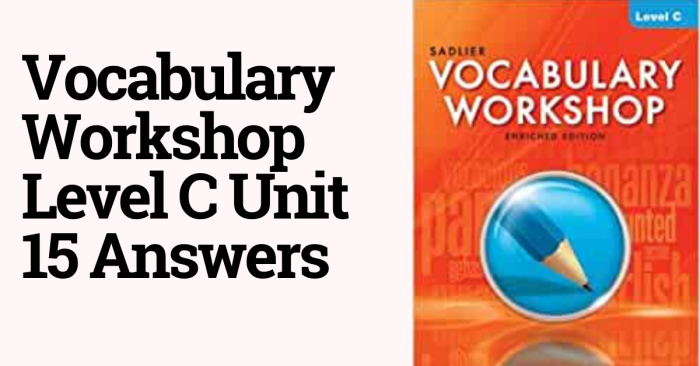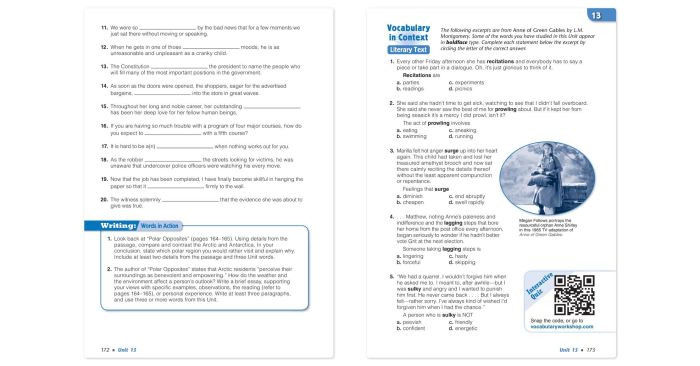Vocabulary Workshop Unit 14 Level C embarks on a linguistic journey, empowering learners with a robust vocabulary foundation. This comprehensive unit is meticulously crafted to engage students, foster language growth, and prepare them for academic success.
Through interactive activities, engaging games, and insightful assessments, this unit deepens students’ understanding of vocabulary, cultivates their communication skills, and ignites a passion for language learning.
Vocabulary List
In this unit, we will explore a new set of vocabulary words that will help us enhance our understanding of the world around us.
Each word has been carefully selected to broaden our vocabulary and improve our communication skills.
Vocabulary Words, Vocabulary workshop unit 14 level c
| Word | Definition | Part of Speech | Example Sentence |
|---|---|---|---|
| Astronomer | A person who studies stars, planets, and other objects in space | Noun | The astronomer observed the stars through a telescope. |
| Biologist | A person who studies living things, such as plants and animals | Noun | The biologist conducted experiments on the behavior of mice. |
| Chemist | A person who studies the composition and properties of matter | Noun | The chemist analyzed the chemical composition of the water sample. |
| Geologist | A person who studies the Earth’s structure and history | Noun | The geologist examined the rock formations to learn about the Earth’s past. |
| Historian | A person who studies the past | Noun | The historian wrote a book about the American Revolution. |
| Linguist | A person who studies languages | Noun | The linguist translated the ancient text into modern English. |
| Mathematician | A person who studies numbers and shapes | Noun | The mathematician solved the complex equation with ease. |
| Physicist | A person who studies the laws of nature | Noun | The physicist conducted experiments to test the theory of relativity. |
| Psychologist | A person who studies the mind and behavior | Noun | The psychologist helped the patient overcome their anxiety. |
| Sociologist | A person who studies society and human behavior | Noun | The sociologist conducted a survey to understand the social dynamics of the community. |
Vocabulary Activities
Vocabulary activities play a crucial role in reinforcing vocabulary words and enhancing comprehension. Engaging activities encourage active participation, foster collaboration, and make learning enjoyable. Here are three engaging activities to practice vocabulary words:
Word Wall Charades
This activity is a fun way to practice vocabulary words and develop communication skills. Create a word wall with the target vocabulary words. Divide students into teams. One student from each team takes turns acting out a word from the word wall while their team guesses.
The team with the most correct guesses wins.
Vocabulary Bingo
Vocabulary bingo is a classic game that can be used to practice vocabulary words in a competitive and engaging way. Create bingo cards with the target vocabulary words. Read out definitions or sentences containing the words. Students mark off the words on their bingo cards as they hear them.
The first student to complete a line or a full card wins.
Vocabulary Pictionary
Vocabulary pictionary is a great way to practice vocabulary words and develop drawing skills. Divide students into teams. One student from each team takes turns drawing a word from a list while their team guesses. The team with the most correct guesses wins.
Vocabulary Games

Vocabulary games are a fun and engaging way to reinforce the vocabulary words that students have learned. They can be used as a review activity, a warm-up activity, or a way to fill in extra time at the end of class.
There are many different types of vocabulary games that can be used, but some of the most popular include:
Pictionary
Pictionary is a classic game that can be used to reinforce vocabulary words. To play, divide students into two teams. One team member from each team takes turns drawing a word on a whiteboard or piece of paper while their team tries to guess what it is.
The team with the most points at the end of the game wins.
Charades
Charades is another classic game that can be used to reinforce vocabulary words. To play, write down a list of words on pieces of paper. Divide students into two teams. One team member from each team takes turns acting out a word while their team tries to guess what it is.
The team with the most points at the end of the game wins.
Vocabulary Assessment: Vocabulary Workshop Unit 14 Level C

Vocabulary assessment is a crucial aspect of vocabulary instruction, enabling teachers to evaluate students’ understanding and retention of new words. It provides insights into students’ progress and informs future teaching strategies.
To design an effective vocabulary assessment, it is essential to consider the vocabulary objectives and align the assessment with these objectives. The assessment format should be varied and engaging to cater to diverse learning styles and provide a comprehensive evaluation of students’ vocabulary knowledge.
Assessment Format
The vocabulary assessment can incorporate various formats to assess different aspects of vocabulary knowledge:
- Multiple Choice:Students select the correct definition or synonym from a list of options.
- Fill-in-the-Blank:Students complete sentences by filling in the correct vocabulary words.
- Matching:Students match vocabulary words with their definitions or synonyms.
- Short Answer:Students provide definitions or use the vocabulary words in sentences.
- Essay:Students write a short essay using multiple vocabulary words in context.
Sample Questions
Sample questions can include:
- Which of the following is a synonym for “loquacious”?
- (A) Talkative
- (B) Quiet
- (C) Reserved
- (D) Eloquent
- Fill in the blank: The politician’s speech was so _____ that it put the audience to sleep.
- (A) Somnolent
- (B) Loquacious
- (C) Laconic
- (D) Eloquent
Alignment with Objectives
The vocabulary assessment should align with the vocabulary objectives by:
- Assessing students’ understanding of the meaning and usage of the target vocabulary words.
- Measuring students’ ability to apply the vocabulary words in different contexts.
- Providing feedback to students on their progress and areas for improvement.
Vocabulary Extensions

Extending vocabulary learning beyond the classroom is crucial for students’ overall language development. By engaging in activities that encourage them to use new words in different contexts, students can deepen their understanding of the language and improve their communication skills.
Creative Activities
- Word Journals:Encourage students to keep a journal where they can record new words, their definitions, and examples of how they are used.
- Storytelling:Ask students to create stories or scenarios that incorporate the vocabulary words they have learned.
- Role-Playing:Engage students in role-playing activities where they have to use the vocabulary words in realistic conversations.
Benefits of Vocabulary Extensions
- Enhanced Comprehension:Exposure to new words in different contexts helps students develop a deeper understanding of language and improve their comprehension skills.
- Improved Communication:By expanding their vocabulary, students can express themselves more effectively and accurately in both written and spoken communication.
- Cognitive Development:Learning new words stimulates cognitive development, as it requires students to make connections between words and concepts.
Detailed FAQs
What are the key features of Vocabulary Workshop Unit 14 Level C?
Vocabulary Workshop Unit 14 Level C offers a comprehensive approach to vocabulary instruction, featuring engaging activities, educational games, formative assessments, and creative extensions.
How can I incorporate Vocabulary Workshop Unit 14 Level C into my classroom?
The unit provides detailed lesson plans and activity instructions, making it easy for educators to integrate it into their existing curriculum.
What are the benefits of using Vocabulary Workshop Unit 14 Level C?
By utilizing this unit, students will expand their vocabulary, enhance their communication skills, and develop a lifelong appreciation for language learning.